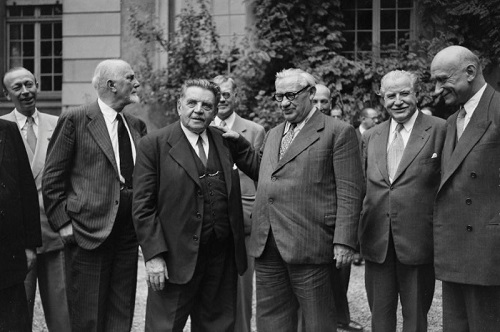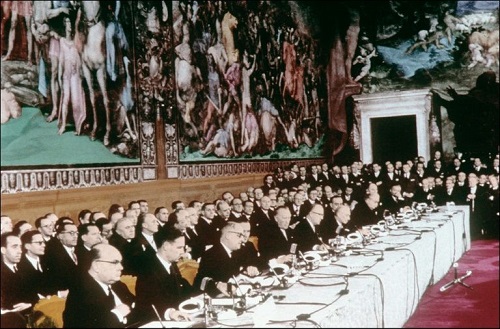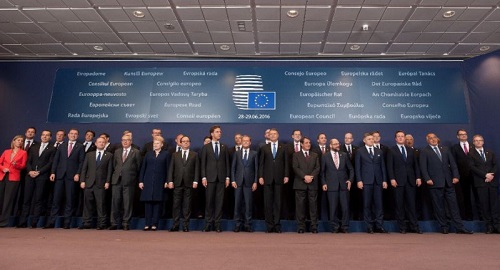Deutsche Welle, 14 December 2012
The EU has
approved a roadmap for further reforms, though concrete decisions are not
expected this week. The way toward a renewed eurozone has been prepared, but a
key question remains: who will pay in the end?
Over
dinner, the leaders of the European Union discussed the lessons they have
learned from the eurozone's debt crisis, and how they want to shape the EU in
the future. A clear outcome has yet to present itself, though the presidents of
the European Council, the eurozone, the EU Commission and the European Central
Bank have been working on a 15-page paper outlining their plans for months.
Under the
heading, "Towards a Genuine Economic and Monetary Union," European
Council President Herman Van Rompuy has collected reform ideas and divided them
into three phases. Van Rompuy wants to achieve a full and complete banking
union and a better coordination of economic policies, and contractually oblige
member states to structural reform. In the end, he expects common borrowing and
repayment of public debt in the eurozone.
In
addition, a "fiscal capacity" would be launched, also known as a sort
of eurozone budget. All eurozone states would be obliged to contribute to this
common pot, which would help them deal with economic shocks and downturns.
Monetary
union, reloaded?
 |
| Rehn thinks a new version of the current eurozone is necessary |
Olli Rehn,
the EU commissioner for economic and monetary affairs, told DW in Brussels that
a "monetary union 2.0," that is, a new version of the current
eurozone, should be created.
"It
should be a stability union, with enhanced economic policy management," he
said. "This would prevent member states from living beyond their means.
The EU should intervene with preventive measures when economic imbalances
become apparent." The new monetary union "should have a much stronger
economic policy pillar, as befits an economic union," he added.
In other
words, the birth defects of the eurozone should be rectified, as Van Rompuy
writes in his reform paper.
Joint debt
remains controversial
Many leaders
of the 17 eurozone countries were able to discover positive features in Van
Rompuy's paper. But Britain, Denmark and Sweden, countries without the euro
currency, have remained skeptical. Many of the individual steps are proving
controversial.
German Chancellor
Angela Merkel has rejected any form of joint borrowing and further steps
towards a union of shared liability. For the moment, she wants a roadmap for
further discussions and reforms, while holding off on any concrete steps.
Other
countries like Italy, Spain and France are calling for more solidarity and
growth. French President Francois Hollande, for example, has strongly suggested
disregarding investments when it comes to the calculation of new indebtedness.
Solvent eurozone members, meanwhile, still in possession of their highest
triple-A credit ratings, have rejected this idea, seeing it as an invitation to
further debt.
Pressure to
decide subsides
Austrian
Chancellor Werner Faymann dampened expectations at the pre-Christmas summit,
expectations which were still being stoked in the summer by EU leaders. At that
time, even the German chancellor had said that the December summit would
determine the future shape of the eurozone.
 |
| EU leaders have yet to decide "where, when and how" the debt of member states will be communalized |
Now,
according to Faymann, is the time for discussion. "I did not expect that
we would agree today on the shape of the European Union for the next 20
years," he said. "But a policy discussion is also important, about
how we can better and more closely work together."
Guy
Verhofstadt, the former Belgian prime minister and current leader of the
liberal faction in the European Parliament, has participated in many EU summits
and knows how the discussions play out behind closed doors. "Interest
rates on government bonds are now a little less than they were a few months ago
- meaning that the pressure on political leaders has subsided,"
Verhofstadt told DW. "They now think they have more time to solve their
problems."
He believes
this is a mistake: "The crisis is not over. The crisis is hitting us all
very hard, economically, socially and financially," he said.
'The key
point is the money'
In fact,
any discussions among the leaders of the euro countries always come back to the
same question, said Martin Schulz, the president of the European Parliament,
who also took part in the discussions.
"It
has been the crux of the debate for months: where, when and how will the debt
and burdens of the member states be communalized, if at all?," he told
reporters in Brussels. "I think that's the core point that we've been
circling for some time." An answer to this crucial question is still
pending.
Verhofstadt
fears that until the German parliamentary election next September, little will
be decided. "The national election calendars still dominate the European
agenda," he said. Even the Italian election early in 2013 could have an
impact on the timetable for reform in the eurozone.
Berlusconi
in Brussels
 |
| Berlusconi's possible comeback was not well received by the markets |
Most of the
leaders meeting in Brussels on Thursday (13.12.2012) were relieved to note that
the former Italian prime minister, Silvio Berlusconi, is apparently no longer
planning to run in his country's next election. Berlusconi had travelled to the
conservative party leaders meeting in the Belgian capital and suggested
Thursday that current premier Mario Monti should run for the conservative camp.
Monti, who
as an independent has led Italy's reform cabinet for the last year and replaced
Berlusconi, has not decided whether he wants to enter the campaign. If he
declines, Berlusconi could yet attempt a comeback. The mere announcement of
Berlusconi's possible candidacy earlier this week upset the financial markets,
resulting in increased interest rates for Italian government bonds.
Related Articles:












No comments:
Post a Comment
Note: Only a member of this blog may post a comment.